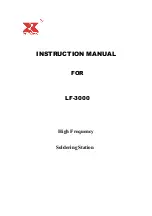
46
6. Notes on batteries/rechargeable batteries
• Keep batteries/rechargeable batteries out of the reach of children.
• Do not leave any batteries/rechargeable batteries lying around openly. There is a risk of batteries being
swallowed by children or pets. If swallowed, consult a doctor immediately.
• Replace flat batteries/rechargeable batteries in time, since flat or too-old batteries/rechargeable batter-
ies may leak.
• Leaking or damaged batteries/rechargeable batteries can cause chemical burns to skin. Wear suitable
protective gloves when handling them.
• Liquids leaking from batteries/rechargeable batteries are chemically highly aggressive. Objects or sur-
faces that come into contact with them may take severe damage. Therefore, keep batteries/rechargea-
ble batteries in a suitable location.
• Batteries/rechargeable batteries must not be short-circuited, disassembled or thrown into fire. There is
a danger of explosion!
• Do not recharge normal, non-rechargeable batteries; danger of explosion!
• Never mix batteries and rechargeable batteries.
• Do not mix batteries/rechargeable batteries with different condition (e.g. fully and partially charged bat-
teries).
• Always replace the whole set of batteries/rechargeable batteries.
• Ensure that the polarity is correct when inserting the batteries/rechargeable batteries (observe plus/+
and minus/-).
Operation of the weather station and/or the outdoor sensor with rechargeable batteries is possi-
ble. However, the lower voltage (battery = 1.5 V, rechargeable battery = 1.2 V) causes the operat-
ing duration and display contrast to reduce strongly.
Rechargeable batteries are also very temperature-sensitive, which will further reduce the oper-
ating time of the outdoor sensor at low ambience temperatures.
Therefore, we recommend using only high-quality alkaline batteries instead of rechargeable bat-
teries for the outdoor sensor as well.
















































